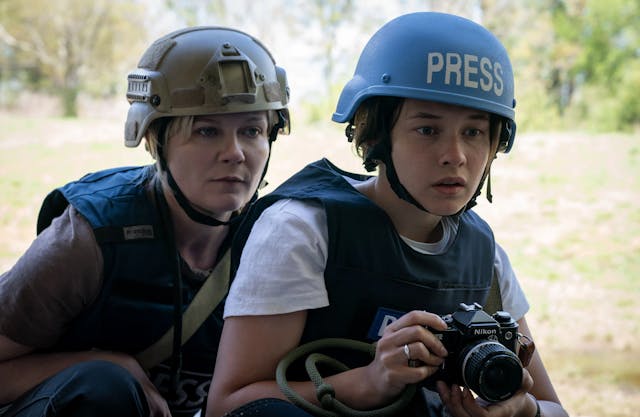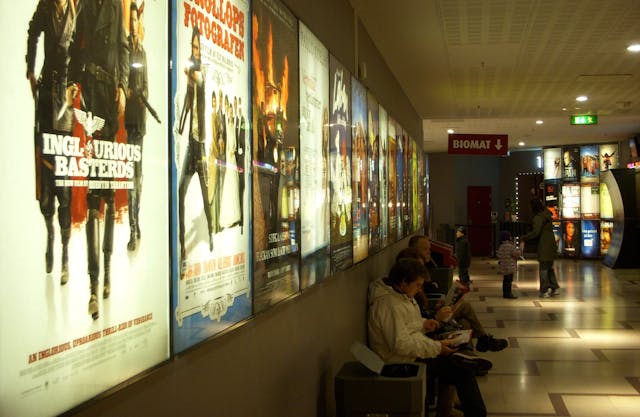Movie Buff Beware: What's at stake in the WGA strike?

The Writers Guild of America strike extends with no end in sight. On one corner, we have the 11,500 members of the bi-coastal branches of the union. On the other, studios and streamer companies hold the money purse strings. For the wordsmiths, this is not just about money but survival.
I was very young when I saw Norma Rae (Norman Ritt, 1979). Sally Fields plays a textile worker, risking it all to unionize the textile mill where she works. At the highest dramatic point, she stops the machine she operates and jumps on top of a table holding a piece of cardboard with the word UNION scribbled on it. Inspired, her coworkers follow suit and shut down the whole place. Fields got a Best Leading Actress Oscar for her troubles, and I got an education about labor and exploitation. No amount of Jimmy Hoffa derring-do tarnished the emotion that movie inflicted on my impressionable mind. As news of the WGA strike hit the headlines, my sympathy goes directly to the workers.
Chances are, the public has no idea what the fuss is about. It has barely made a dent in our media diet. The disruption manifested immediately in the realm of Late Night comedy. Those shows, written on the run daily, have gone off the air. Some series, like Abbott Elementary, have interrupted production of their next seasons, but the current one is in the can and ready to broadcast. The second season of The Bear and the third of Only Murder in the Building are complete. Summer might look fine and dandy with the most talked about series and movies safe.
The only film officially on hold is Marvel Studios' new version of Blade, with Mahershala Ali and Mia Goth attached. Maybe that is the reason why movie studios are not budging. The pipeline is full. But it will not be so much longer. But come September, we will begin to see the effects. If it goes further, 2024 will be severely compromised.
What do the writers want
Changes in culture, technology, and the distribution business have reduced income streams for writers, especially those working on television. When broadcast was the only game in town, a series would produce up to 22 episodes per season, with a big writers' room working full time for about nine months per year. Once the series reached the hallowed number of 100 episodes produced, it would go into syndication. That is when residuals would kick in. Besides the salary earned with working hours in the room, writers began to reap extra income every time the studio sold the series for reruns at local markets or international sales to TV stations abroad.
Streaming services cut the season length of their original series down to 10 to 6 episodes - in old-timey TV terminology, that is a mini-series - which means fewer days of work and shorter contracts. Since the content lives forever on the streaming channel, it never gets to syndication, and international sales are null. Every streamer or studio already shows their stuff abroad. They do not need to sell to local channels. Add up inflation. Almost half of the writers fall to the minimum pay rate. Hence, the WGA wants increased pay rates and higher contributions to retirement plans and health insurance.
Streamers are free of the broadcast calendar. They round up talent as they please and produce as many seasons as they want at their desired pace. They do not need to hire enough people to churn 20-something episodes over nine months. A mini-room of writers maps out a season and writes a pilot and a few episodes. Then, they disbanded it. A new set of cheaper writers can finish the job. Everything happens before the camera rolls, so they save on rewrites. Actress Jenna Ortega disparaged the quality of the writing on the Netflix series “Wednesday” and improvised as cameras rolled.
The Next Generation
A further problem comes with the decimation of an apprenticeship dynamic. The writers' room was a formative space where young writers could stretch their creative muscles and learn from the veterans around them. Check out this eye-opening thread by screenwriter and showrunner Sierra Ornelas (Rutherford Falls).
Up-and-coming writers will lose a valuable entry point into the business. They will also find unfair competition from algorithms. The encroaching of Artificial Intelligence in scriptwriting poses much uncertainty over the future and pertains to one of the WGA demands met with deafening silence by the studios.
Per their negotiation memo, the WGA wants to “regulate the use of artificial intelligence on MBA-covered projects: A.I. can’t write or rewrite literary material; can’t be used as source material; and Minimum Base-covered material can’t be used to train A.I.”
As you read this, a studio head is feeding Jane Austen novels to an A.I. bot to crack a spec script in case the strike extends too long and reserves of completed films are depleted.
Why so serious?
One of the most disturbing trends in film Twitter has to be the gloating of some users about the hypothetical displacement of human talent by Artificial intelligence.
It's funny how all these writers on strike up in arms about studios possibly using AI to replace them aren't mentioning how THEY will be using AI and taking all the credit. @JoshLekach
Enthusiasts with too much free time have tinkered with AI software to produce everything from stills of an imagined film by David Cronenberg to a trailer for a Star Wars movie by Wes Anderson.

A still of the imaginary film "Galaxy of Flesh" / Photo by Keith Schofield
The results that some tout as “amazing” are, to my eyes, derivative and soulless. If they work at all, it is satire. But their creators are deadly serious.
That does not mean that AI will not improve. For all that we know, it can develop up to a point where AI will dispense with viewers and churn out content to be consumed by other AI. What will techno fans say? We don’t know how far AI will go and what role it will have in the future of creative arts. In one of his controversial Facebook posts, director and screenwriter Paul Schrader says…
"The Guild doesn't fear AI as much as it fears not getting paid. Burrow into the logic. It's apparent that AI will become a force in film entertainment. Do you need a new episode of "CSI: Vegas"? ChapchatGPT will deliver that in a matter of seconds. And it will be good. It will cull all the episodes of CSI for the last twenty years and come up with something both generic and contemporary." - Paul Schrader.
Say it ain’t so, Uncle Paul! I think Schrader is right about the technology's aptitude to duplicate narratives at their most schematic. I can see how an algorithm can generate a CSI episode. After all, it is one of the recent T.V. hits more reliant on a predictable structure. But an AI would not be able to write, say, something like Schrader’s scripts for “Taxi Driver,” “First Reformed,” and “The Card Counter”.
It’s not by chance that Joe Russo, one half of The Russo Brothers' directing team, looks forward to this barren future. In a panel at the Sands International Film Festival in St. Andrews, Scotland, he said
"...what you could do with it is obviously use it to engineer storytelling and change storytelling. So you have a constantly evolving story, either in a game, movie, or TV show. You could walk into your house and save the AI on your streaming platform. "Hey, I want a movie starring my photoreal avatar and Marilyn Monroe's photo real avatar. I want it to be a rom-com because I've had a rough day," and it renders a very competent story with dialogue that mimics your voice. It mimics your voice, and suddenly, you have a rom-com starring you that's 90 minutes long. So you can curate your story specifically to you."
It sounds like a Russo Brothers movie! No surprise he is looking forward to it. You can find a full write-up of the encounter at Collider.
Using some form of AI is not the gotcha they think it is. We already use AI for mechanical tasks: I transcript interviews with Sonix. Grammarly is a more sophisticated text corrector than the one installed in your word processor software. But we stand at a crossroads now, everybody, not just the writers in the picket line. Technical advancement is not inevitable. We have a say in how far it goes. The viability of scriptwriting as a way to make a living is not the only thing at stake in the WGA strike: we are also talking of the humanity in our entertainment, the feeling in our distractions. We must protect whatever degree of art remains in commercial film and TV. The small screen, the movie theater, and the Art House are at stake.
Watch “Lonely”
“Lonely” is a powerful reminder that no one is ever truly alone, and there is always someone out there who cares and wants to help.
Stream NowWant to get an email when we publish new content?
Subscribe today


























